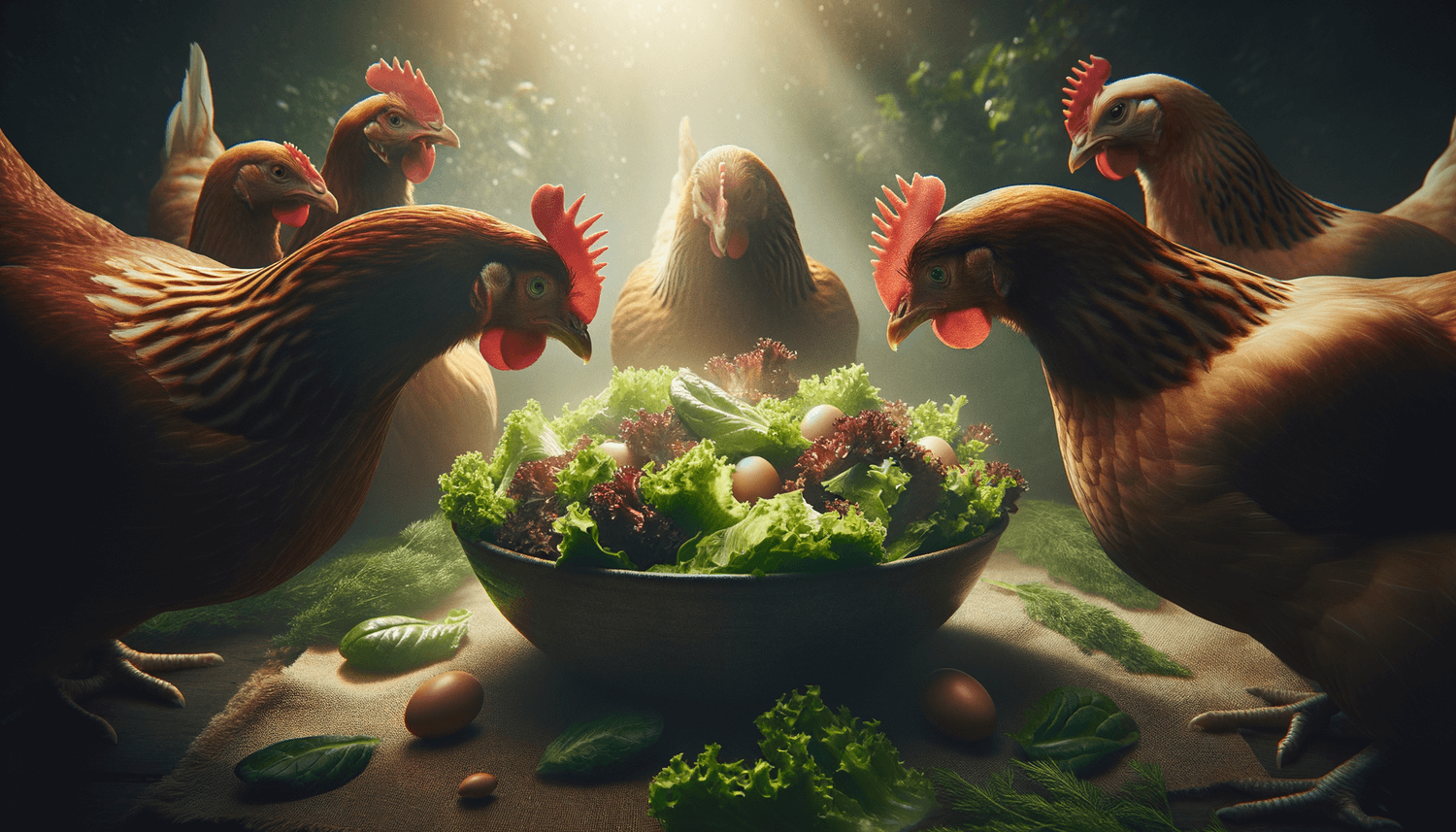Salad lovers, assemble! If you’ve ever wondered whether your feathery backyard companions can join you in indulging in nature’s colorful bounty, this blog post is for you! We’ll dive into the scrumptious world of greens, exploring if and how your clucking cuties can partake in the salad feast. We’ll whip up a balanced diet sprinkled with nutritional value, discuss the potential benefits and risks for your flock, and even share some tips on how to prepare the ultimate bird-friendly salad. So grab your lettuce, sharpen your knives, and let’s get mixing with our hens in mind!
Can chickens eat salad?
Yes, chickens can indeed eat salad and it is safe for them! Leafy greens and various salad components make a healthy addition to their diet, providing essential nutrients and vitamins. Just make sure that the salad is pesticide-free and doesn’t include any toxic plants or ingredients, such as avocado or raw onions, to ensure the safety and wellbeing of your feathered friends.
A balanced diet for your clucky companions
Just as we humans strive to maintain a balanced diet for optimal health, our feathered friends need a well-rounded meal plan too. A chicken’s diet should primarily consist of high-quality chicken feed, which should make up around 80-90% of their diet. This specially formulated feed is designed to cater to their unique nutritional needs, allowing them to grow, lay eggs, and maintain their overall health and wellbeing.
The remaining 10-20% of their diet can consist of tasty treats such as fruits and vegetables. This is where your chickens’ salad escapades come in! Supplementing their high-quality chicken feed with a salad medley packed with vitamins and nutrients can help keep them in tiptop shape. Just remember to keep treats in moderation, so your feathered pals can continue enjoying a balanced and nutritious diet year-round.
Nutritional value of salad for chickens.
Feeding salad to chickens can offer a variety of nutritional benefits, thanks to the vitamins, minerals, and hydration found in different vegetables and greens. Vegetables such as lettuce, spinach, kale, and collard greens contain essential vitamins like A, C, and K. These vitamins are necessary for maintaining a healthy immune system, supporting good vision, and promoting blood clotting in chickens.
Aside from vitamins, salads are a good source of minerals like calcium, potassium, and iron. Calcium is crucial for strong bones and eggshell formation, while potassium aids in maintaining the proper function of muscles and nerves. Iron, on the other hand, helps in producing hemoglobin, which carries oxygen in the blood, keeping your chickens energetic and active.
Leafy greens and vegetables also come with the added benefit of hydrating your chickens, given their high water content. Providing your chickens with fresh, crisp veggies can help keep them cool during hot summer days, offering a refreshing treat that also quenches their thirst.
Moreover, salads can potentially offer some fiber, which is essential for a chicken’s digestive system. This helps in maintaining regular bowel movements and keeping their gut healthy. However, chickens don’t require a high amount of fiber, so it is essential to ensure that they are still obtaining the nutrients they need from high-quality chicken feed.
Nutrition table of salad for chickens.
| Information | Description |
|---|---|
| Nutritional Value | Salads provide essential vitamins (A, C, K), minerals (calcium, potassium, iron), and hydration to chickens. |
| Suggested Serving Size | Treats like salad should make up 10-20% of a chicken’s diet. The majority should still be high-quality chicken feed. |
| Safe Feeding Practices | Ensure the salad is pesticide-free and contains no toxic plants or ingredients, such as avocado or raw onions. |
| Preparation | Chop or tear the vegetables into smaller pieces for easier consumption and digestion by the chickens. |
| Potential Risks | Overfeeding salad can lead to dietary imbalance. Avoid toxic ingredients and maintain a balanced diet. |
| Hydration | High water content in salad vegetables aids in hydrating chickens, especially on hot days. |
| Digestion | Fiber from salad may help maintain a chicken’s digestive system and regular bowel movements. |
| Seasonal Availability | Many salad vegetables are available year-round, while some may be more abundant during specific seasons. |
| Other Benefits | Feeding salad to chickens offers variety in their diet, leading to happier and healthier birds. |
Tips for choosing salad ingredients
When preparing a salad for your chickens, it’s important to select a variety of vegetables and greens that provide an array of nutrients for your flock. Popular choices include lettuce, kale, spinach, broccoli, carrots, and cucumbers. However, make sure to avoid toxic foods such as avocado, raw onions, uncooked beans, and chocolate.
Introducing salad to your flock
When introducing a salad to your chickens for the first time, it’s best to start with small quantities and observe how they respond to the new treat. Gradually increase the amount you provide and mix in different vegetables to keep your flock interested and engaged in their meals.
Reducing food waste
Feeding salad to your backyard chickens is not only a delightful treat for them, but it’s also a fantastic opportunity to reduce food waste at home. Consider using leftover salad, vegetables, or greens that may be past their prime for human consumption but are still suitable and safe for your chickens.
Final thoughts
In conclusion, chickens can safely enjoy salad as a treat that provides a wealth of nutritional benefits. It’s important to remember that the key to a healthy and happy flock is a balanced diet consisting primarily of high-quality chicken feed supplemented with treats like salad. So go ahead and share the joy of a crisp, refreshing salad with your feathered friends, and watch them flourish!

















